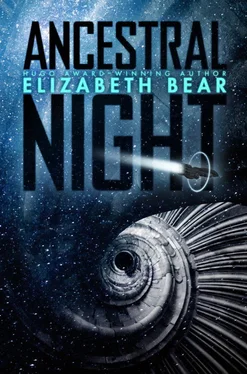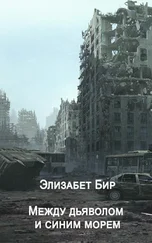He was definitely teasing.
Gently, I pushed the cat off. She went one way—toward a nice upholstered bulkhead because I’m not a monster—and I floated, in reaction, toward the forward port. The early astronauts had to argue to get windows, I’m told. Now I looked out of this one, frowning down at the long, barred spiral curve of the galaxy we needed to move toward the center of—a center that was much smaller and farther away than we had ever meant for it to be.
“I don’t want to die in a bubble,” I said.
Connla said, “We won’t do any transfusions.”
“Hah.” But it was decided, and he helped me peel off my isolation skin.
♦ ♦ ♦
The closest port was likely to be a pirate outpost, which tended to be scattered in the trailing reaches of the galaxy. Off the beaten track, protected and concealed. That wouldn’t help us, because we didn’t know where it was, couldn’t find it, and didn’t have anything to trade once we got there. But there were fringe worlds and fringe stations, places where respectable people mingled with the galactic underbelly. Those wouldn’t be without Synarche oversight. Anyplace where we could get in contact with civilization, we could trade. We didn’t have a prize, but we had knowledge, and our information on pirate and harvester activity—and what little we had on the artificial gravity—would get us help and repairs.
We set our sights on Downthehatch, which we could probably just about reach. Maybe. It was a dodgy little place by reputation, but it was worth a try, given the alternatives. I was uneasy enough about it that I might have voted the other way if I hadn’t already known that Singer and Connla had their minds made up. I know gray markets will always exist, but I have an allergy to people who took from the commonwealth and who also sold it out to predators.
“You’re not trading my skin,” I said.
“We’ll tell anybody who asks that it’s a holotoo,” Connla promised. “Garlynoch work. I’ve seen some of their stuff. It could pass as a really nice one.”
Singer said, “Unless you decide you want a more rigorous medical intervention than I can provide.”
Once under way again, we didn’t have much to do. I read a few nineteenth-century novels in Russian, Japanese, and English. They’re great for space travel because they were designed for people with time on their hands. Middlemarch . Gorgeous, but it just goes on.
The early word-processor era around the turn of the Earth millennium is good for that too, but the quality of the prose in those generally isn’t as high. Some of those epics, though, run to ten or twenty volumes, and every volume in them is thirty hours of reading time.
I even own a paper book—a compact, ultralight, onionskin volume with real fiber pages. It dates from the last third of the twentieth, and it’s called Illuminatus! I keep it because it was a gift, and it’s not so much a keepsake as… a kind of reminder. Of a time when I was really dumb.
It’s the one book on hand I never read anymore.
Connla studied strategy games, those favored by Synarche syster species and even, when he could find them, those invented by other aliens. Fortunately, Singer liked them too, so I had never been forced to learn the ins and outs (literally) of a-akhn-an or three-dimensional Goishan go. Which looks to me more like Chinese checkers anyway.
Long-haul flyers need hobbies. I know one AI on a salvage vessel who took up writing 3D scripts and interactives. She did so well she quit the salvage business and went off to live in the AI equivalent of a luxe beach home, some computronium colony around a dwarf star in the Core, with all the company, low lag times, processing cycles, and lack of travel you could want.
She—or a sub, anyway—got back into salvage a few ans later. The story as I heard it goes that she couldn’t write anymore, with all that stimulation, so in order to maintain her lifestyle, she had to near-isolate a branch of herself to get some damned writing done.
Still, nice work if you can get it.
I was floating near a viewport with my screen and Jane Eyre . It’s kind of horrifying to think of an era when people were so constrained to and by gender, in which the externals you were born with were something you would be stuck with your whole life, could never alter, and it would determine your entire social role and your potential for emotional fulfillment and intellectual achievement. So I wasn’t really reading. I was thinking about social history (I grew up in a human-female isolationist clade, and since I left it’s given me a powerful aversion to species and gender absolutists) and watching the bands of lensed light ripple by, wondering if it was getting a little brighter out there. The folded sky could be hypnotizing.
I realized that I could feel those folds and lenses on my skin.
They felt like—like ripples in a wave tank, passing over me as I lay just under the surface. A sense of pressure, and then a sense of suction, behind. Not like a touch, exactly. More like something passing near your skin, close enough that the sensory hairs can feel it, but it doesn’t brush your body exactly. Or like when you’re tuned into somebody else’s senso and getting what they’re getting, only at a remove.
“Koregoi senso,” I muttered, making a fist with my right hand. It shimmered in response.
I concentrated, closing my eyes. Something under the lensing ripples, something shadowy and vast. Convoluted. Arcing, sliding, gliding—
Singer said flatly, “I made a mistake.”
It took me a few seconds to blink back into myself. In that time, Connla had pulled himself out of his study hood and floated over. “What kind of a mistake?”
“We don’t have the fuel to get to Downthehatch before you and the cats starve to death. Or rather, we do. But then we couldn’t brake. Even if we recycle and reprint every organic object on this ship, including the cats and your own bodily waste.”
“We’re not eating the cats,” Connla said.
“They’ll eat you,” Singer pointed out.
Connla and I both shrugged. Cats were predators. Once you stopped being warm, you were just a source of calories. That was their moral calculus.
I said, “How is this possible?”
“I don’t know. I’m running diagnostics now—” He cleared his nonexistent throat. “So it looks like one of the storage tanks was damaged when we were shot off the prize. Sensors were damaged. They didn’t register it, and didn’t register the leak. But there’s less fuel than there should be.”
“Not to get nitpicky,” I said, “but what if we ditched enough mass to compensate?”
“We don’t have enough ditchable mass to do that with. There’s not a lot of Singer going spare.”
This was true, and a drawback of the recycle-and-print model we were operating on. Connla and I looked at each other. I said, “Well. There’s no point in decelerating now. Let’s stop adding v and just keep going, and try to think of a solution before we become an ironic footnote to salvage tug history, shall we?”
♦ ♦ ♦
We went to our separate corners to muse, and mope, and stare thoughtfully out the viewports. Keeping ourselves occupied.
In the face of the unthinkable, there wasn’t much else to do except think about it obsessively. And sometimes, staring out the window turned out to be effective, as I discovered when something finally tickled my awareness just long enough to be useful.
I looked up, and with my fingertips, turned myself around.
“I have a solution,” I announced. I put more conviction in it than I was really sure it deserved.
“It’s better than being part of the precipitate,” Connla replied, but it was habitual and his heart wasn’t in it. He gazed at me with the sort of interest one reserves for reprieves from the guillotine and similarly refocusing events. “Let’s hear it.”
Читать дальше












